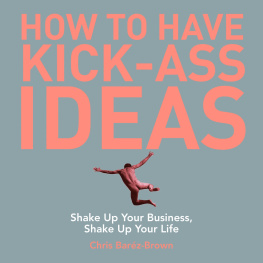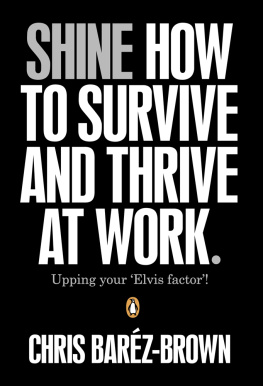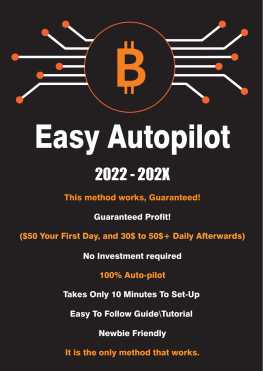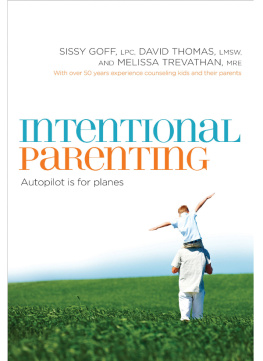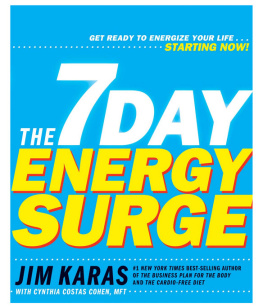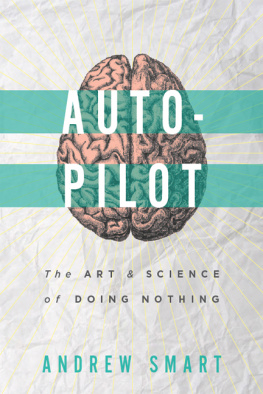To all the crazies, the weirdos and the freaks. To all those who dont fit in but stand out. To everybody who knows that this is the most extraordinary of lives and its happening right now.
To You: the awakening.
Contents
Introduction
Over the years, I have noticed that I have not been myself.
I dont mean that somehow I have been out of sorts or physically unwell; I mean that someone else has been living my life. I have moments where I am deeply connected to myself, my family and friends, the work that I do and, indeed, this amazing planet on which we live. These moments are special. When they happen, I feel like I have absolute clarity. I am very present and very aware. There is absolutely nothing missing. In fact, everything is just perfect. When I experience those moments, I feel as if I truly connect to who I am and where I fit in this wonderful thing called life. There are no fears, no worries and no concerns because everything is just right, and from this place I know that everything is fun, light and playful, and that the essence of this life is a fantastic game.
The downside is that this state is all too often fleeting, and before I know it I am back to leading a pinball life where I am bouncing around at ridiculous speeds, out of control and scoring points only by crashing into targets unintentionally. Then, by chance, I pop back out of it, a day, a week or even a month later, and I wonder what the hells been happening.
Most of us have experienced driving from point A to point B and reaching our destination with no recollection of large chunks of the journey. We arrive safely and were in command of the vehicle throughout the journey, and yet it feels as if somebody else was at the wheel because we can hardly remember anything about getting there. We were driving on autopilot.
Truth is, this doesnt just happen while sitting at the wheel; this happens every day that we are alive. It happens at work, it happens at home, it happens in life, and this is what Wake Up! is here to address.
AUTOPILOT LIFE
The reason that most of our lives are spent on autopilot is due to the way our brains work. The brain works in two ways, consciously and subconsciously, and together this uses up a large chunk of our overall energy around 25 percent, according to many clever science folk.
The conscious brain is used for processes involving logic, rationality and higher levels of cognitive function. When we are trying to decide whether leasing a car is better than buying one, or whether ground-source heat pumps will really save us money while helping the planet, we are using conscious processing. This takes a lot of energy, which is why when we tackle a particularly tricky intellectual challenge we often feel very tired quite quickly.
The subconscious brain, on the other hand, is a more efficient machine. It is adept at looking for patterns and similarities in what we are experiencing now compared to what we have experienced before. If something looks like a close-enough fit to something from the past, the subconscious assumes they are the same and therefore directs our behavior accordingly so that we respond in the same way as we did last time. So, if we have noticed that the kitchen door no longer shuts as it should, when we are carrying two glasses of wine out and we dont the hear the tell-tale click of the latch, our heel automatically taps it in just the right place at just the right pressure to close it perfectly. Sweet. This takes no thought; and that is the beauty of autopilot.
It is a brilliantly efficient process that saves no end of effort and is absolutely necessary for us to function. We cannot consciously deal with every detail of our lives; if we had to do so, we would be exhausted. Just think how hard it is to learn a new language or an instrument, or even drive a car for the very first time. When we are carrying out menial tasks, things that are habitual or things that we have practiced often enough for them to feel natural, then the subconscious is rather wonderful at conserving resources for use when we do things that are more taxing. The subconscious thinks faster and more automatically than the conscious brain, which is why people who play tennis or the glockenspiel brilliantly have it to thank. They have practiced to the point that the subconscious takes over and does a much better job than the slower conscious thinking. Its undoubtedly an exceptional performer in those situations, and its important to make that distinction.
The challenge is that the subconscious has no off switch. As we tend to live lives of habit with ingrained routines, most of what we do is stuff weve done before, and therefore autopilot becomes the default mode of existence. If we were a tennis player, that might not be a bad thing, but most of us dont spend all our time on a tennis court life is more complex than that. We therefore need to manufacture a better balance between the two systems of our brains. It is impossible to quantify what the right balance should be, or indeed the capacities of the conscious to run more of the show, but most of us know instinctively that if we can become a bit more awake and liberated from autopilot every day, it can make a huge difference to how we live our lives.

THE CAVEMAN BRAIN
The human brain hasnt evolved a great deal over the last 50,000 years, and we retain today survival instincts designed to protect us from prehistoric dangers, such as beasties wanting to eat us, rather than the perils of modern living.
To survive, we developed a mechanism within our brains that would spot potential dangers instantly and react to them immediately. It served us well back then, as the faster we reacted to even the vaguest of threats, the better chance we had of survival. Being fearful was therefore a key factor in your genes procreation, so over time it became integral to humanitys DNA.
Those hazards are now long gone, and yet most of us still exhibit an instinctive aversion to risk. Its part of who we are.
When we are on autopilot we dont question that negativity bias, we just obey it. The caveman brain is hardwired to be wary of anything new and different, or anything that challenges our identity and what we know to have worked in the past. The caveman likes things to stay the same.
Of course, the caveman is only trying to help us. He is trying to keep us safe. He will never go away as he is part of our design. However, we can learn how to listen to him and respond rationally, rather than obey unthinkingly. When we notice him producing a fear response, pumping us full of adrenaline to encourage a fight-or-flight-or-freeze response, we can stop, breathe and ask: What is really threatening about this situation? Often our inner caveman likes to stimulate a bigger reaction from us than is warranted.
While you are on autopilot the caveman is in charge; when you wake up he loses his grip.
Understanding how to listen to him, appreciate what hes telling you and then consciously choose what to do next is key to finding liberation and leading a shinier life.
Lets consider the two ends of the conscioussubconscious spectrum.
SUBCONSCIOUS MIND
When we are on autopilot, our subconscious is in control. This means that we tend to be very reactive to the world in which we live.
When we experience any kind of emotion, we react, and our reactions dictate how our day goes. The subconscious loves fantasy and will entice us into a daydream whenever possible. Daydreams are usually about the past or the future and create a huge distraction from what is going on right now. When we are on autopilot we make snap decisions about everything, and very often theyre bad ones. If were feeling tired, we gulp down a sugary soda rather than taking a few minutes out to relax and recharge. If weve had a hard morning, the comfort of an overindulgent lunch might be what we reach for, making us inefficient for the rest of the day. It could be that the tasks we need to deliver today seem tough and pointless, so we turn to Facebook as a welcome distraction. Autopilot feels a little bit numb. Its passive. Its disconnected. When it kicks in we often feel as if we are very much on our own and that survival is our number-one priority. We lose awareness of who we are and what is important because we are driven more by instinct than by insight.
Next page

